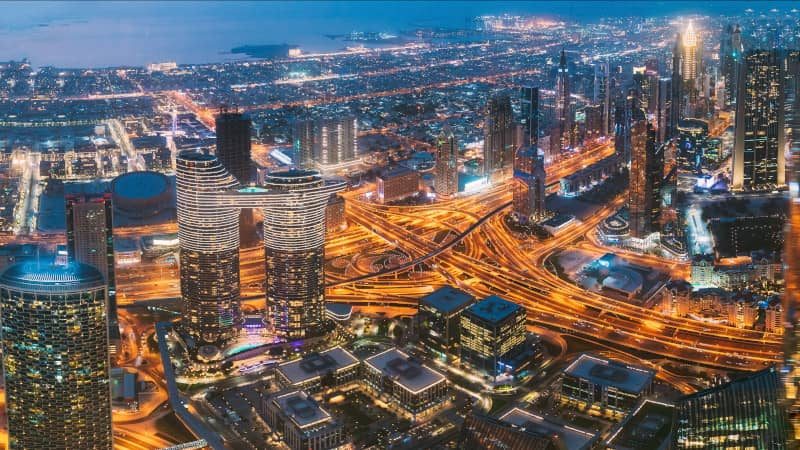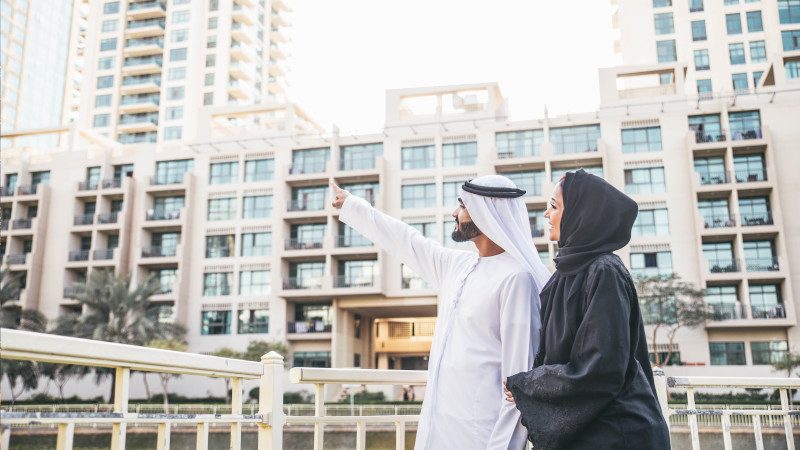Guide to Getting a Mortgage in Dubai, UAE
You can buy a property in Dubai, UAE in two ways: Fully paid or with a mortgage. While a fully paid investment may be more cost-effective in the long run, a mortgage gives you more flexibility in how you manage your finances.
Before you start looking for your dream home, you should understand how mortgages work in the UAE. This guide contains the following information on the topic:
- 1. Mortgages in the United Arab Emirates
- 2. Who can get a mortgage in the UAE?
- 3. Types of Mortgage Interest rates in the UAE
- 4. How much can you borrow for a UAE mortgage?
- 5. How to apply for a mortgage in the UAE
- 6. Mortgage agreements in principle
- 7. Documents to get a mortgage in the UAE
- 8. UAE mortgages: step-by-step
- 9. Mortgage costs in the UAE
- 10. Property insurance in the UAE
- 11. Life Insurance
1. Mortgages in the United Arab Emirates
The UAE mortgage market is now well-established, with international and local lenders providing home loans to UAE residents, non-residents of the UAE, and expats. Foreign nationals living in the UAE can obtain residential and buy-to-let mortgages, though the criteria vary.
2. Who can get a mortgage in the UAE?
As long as you can demonstrate your income, almost anyone in the UAE can get a mortgage. Business income, Salary, commission, and rental income are all examples of sources of income.
WHO IS ELIGIBLE FOR MORTGAGE IN THE UAE?
- Employed as a UAE Resident
- Self-Employed Resident of the UAE
- Non-Resident Employed in the UAE, Non-Resident Self-Employed in the UAE
- Between the ages of 21 and 65
- Have a monthly salary of AED 10 K and a monthly self-employment income of AED 25K
Keep in mind that the minimum salary for a home loan in Dubai varies depending on the bank. Some banks allow UAE nationals with at least AED 8k in monthly income to apply for home loans in Dubai, but this is largely dependent on bank policies.
3. Types of Mortgage Interest rates in the UAE
Mortgages in the UAE are available with either a fixed or variable interest rate. Fixed terms are typically three to five years long, but they can be as short as one year.
With the current offers from the lender, mortgage rates stayed fixed for certain years then it changed to variable interest rates.
Fixed-rate mortgages give you certainty about the size of your repayments for a set period of time, but variable rate mortgages are worth considering if interest rates are expected to fall. Terms are typically set at 25 years, and the loan must be repaid before the age of 70.

4. How much can you borrow for a UAE mortgage?
You can apply for a home loan directly through a bank or through a mortgage broker. In cities such as Dubai and Abu Dhabi, you can also find comparison on our websites where you can compare offers from various lenders.
Expat borrowers can benefit greatly from the services of a mortgage broker. Crown Capital Finance will be able to guide you through the complexities of the local market and find you the best mortgage deal for your needs. Mortgage applications in the UAE are typically processed within a few weeks.
5. How to apply for a mortgage in the UAE
You can apply for a home loan directly through a bank or a mortgage broker. In cities such as Dubai and Abu Dhabi, you can also find comparisons on our websites where you can compare offers from various lenders.
Expat borrowers can benefit greatly from the services of a mortgage broker. Crown Capital Finance will be able to guide you through the complexities of the local market and find you the best mortgage deal for your needs. Mortgage applications in the UAE are typically processed within a few weeks.

6. Mortgage agreements in principle
Before submitting a full application, it can be beneficial to reach an agreement in principle. An agreement in principle entails the bank providing Mortgage Pre-approval for your loan before you find a property. This allows you to make an offer on a home knowing it is within your budget.
7. Documents to get a mortgage in the UAE
The documents needed will vary depending on your situation, but our mortgage brokers will be able to discuss this with you.
In general, the following documents will be required for your mortgage:
- Copy of your passport, visa, and Emirates ID
- Salary certificate addressed to ‘Crown Capital Banking and Finance Consultancy’
- Last six months’ payslips and bank statements
- Latest credit card statements
- Proof of your current address – copy of DEWA bill or tenancy agreement
Find out a full list of mortgage documents you will need to successfully obtain a mortgage in the UAE based on your status.
8. UAE mortgages: step-by-step
The following are the primary steps in obtaining a mortgage in Dubai, UAE:
- Choose whether to contact the bank directly or through a broker.
- Do your homework to find the best mortgage for your situation.
- Obtain an agreement in principle from the bank and request a letter as proof;
- Make an offer on a suitable property within your budget.
- Pay your deposit to confirm your purchase and set a completion date once you’ve agreed on a price.
- The mortgage lender will release the funds to the seller on the completion date.
9. Mortgage costs in the UAE
When purchasing a property in the UAE, you will incur certain costs, which may vary slightly depending on whether you are in Dubai, Abu Dhabi, or another Emirate. The table below details the general fees that must be paid in addition to the cash deposit (or downpayment).
| Bank Arrangement Fee | 0 to 1.5%* of loan amount |
| Valuation Fee | AED 2,500 – AED 3,000* |
| Land Department Fee | 4%* of the purchase price plus AED 580 (Abu Dhabi 1%-2%) |
| Trustee Fee | AED 4,000* |
| Mortgage Registration Fee | 0.25%* of the mortgage borrowed plus AED 290 |
10. Property insurance in the UAE
Buildings insurance is required in the United Arab Emirates when taking out a mortgage. It is entirely up to you whether you obtain content insurance. In the UAE, insurance policies can be very affordable, and you can buy buildings and contents separately or as a package.
The amount you will pay is determined by the value of your home and belongings. As a general rule, your annual premium should be around 0.1% per annum?month? of the total property value and contents.
Property insurance subject to lenders policies.
11. Life Insurance
Due to the lack of property taxes, investing in a Dubai property could potentially generate a high return on investment. Expect returns of more than 6%, with double digits in key neighborhoods, making it one of the best places to invest in the property market.
Final Notes
Purchasing property in Dubai, UAE is a wise investment. Dubai, in particular, is a great place to invest due to its low property taxes and growing population. The visa program, as well as the high rental yields and low property prices, make it an appealing investment opportunity.
If you found this guide useful or are looking for the best mortgage advisors and mortgage deals in the UAE, get in touch with our team of mortgage experts.






Very interesting details you have noted, regards
for putting up.Blog range